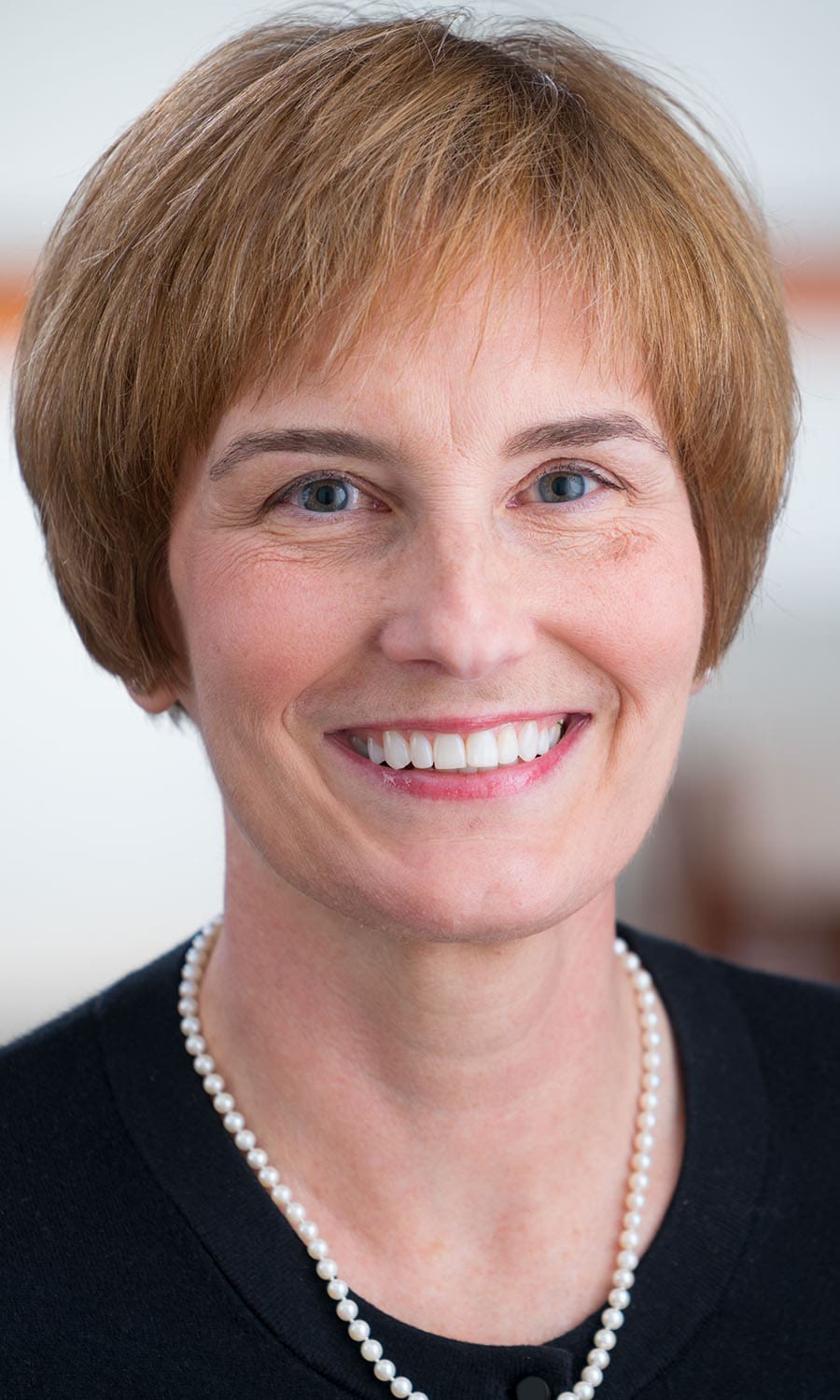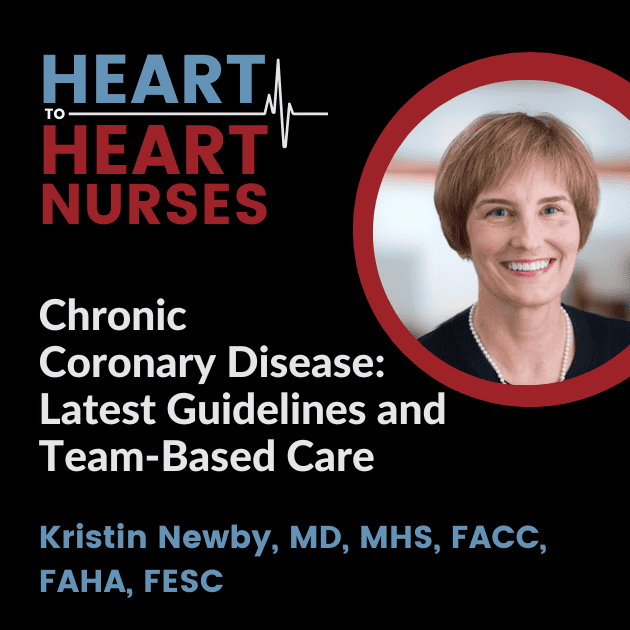Chronic coronary disease is common and becoming more so. Learn what’s new in the 2023 guidelines about testing and treatment from guest Kristin Newby, MD, MHS, FACC, FAHA, FESC. Dr. Newby also discusses the importance of team-based, patient-centered care.
Welcome to Heart to Heart Nurses, brought to you by the Preventive Cardiovascular Nurses Association. PCNA’s mission is to promote nurses as leaders in cardiovascular disease prevention and management.
Geralyn Warfield (host): I’d like to welcome our audience to today’s episode where we’re going to be speaking with Kristin Newby about chronic coronary disease. Kristin, could you introduce yourself to our audience?
Kristin Newby (guest): Sure. Thanks for having me. I’m Kristin Newby, I’m a cardiologist, and was co-chair of the recent 2023 AHA/ACC guidelines for chronic coronary disease.
Geralyn Warfield (host): So, we have an exceptional expert across the table from me today, and we’re really looking forward to learning more about some of those new guidelines. But before we get into that, I’m hoping we could address the importance of team-based care and social determinants of health. So, could you talk about that a little bit, please?
Kristin Newby (guest): Yeah, that’s a [00:01:00] great question. And I think probably one of the most important things that we focused on in our deliberations around the guidelines.
And when I think about team-based care, I think of chronic coronary disease as complex. You know, these patients are older. They have multiple health issues. They certainly have multiple risk factors for coronary disease. So, they need support in many, many, many ways, and more than just a single MD cardiologist can do in a 20-minute clinic visit. Right?
So, everybody is important.
The primary care physicians are important partners to the cardiology physicians and APPs. The nurses are important, whether that’s in a role of medication education or coronary disease education, or actually delivering care in the community, being that link to the community. We need [00:02:00] pharmacists. We need social workers.
You know, we think about the guidelines, and we say, “Oh yeah, it says we should do X, Y, Z and how we should do it.”
But there’s context around that. And every patient is different. Every patient’s social, physical, family environment is different. And so, it’s so important that we have this team of people that’s thinking about that patient as an individual. And incorporating all those various inputs into how we care for them, who’s caring for them, and how we deliver the things that we know are going to be beneficial for them.
And not everything is going to work. And the patient has to be at the center of that, or their caregiver, helping us make these decisions in a shared decision-making and team-based approach.
Geralyn Warfield (host): I am very excited for you [00:03:00] to basically have talked about the personalization of care and how important that is.
That never has there ever, there’s never been anything that’s one size fits all, whether it’s in clothing or whether it’s in medicine. Everyone is a little bit different. But something that really struck me when you were sharing that hadn’t really come into my mind prior to this, is things can change.
Kristin Newby (guest): Mm-Hmm.
Geralyn Warfield (host): So, just because you think you know a patient and you think you know their story, and you think you understand that, we recognize that there are sometimes insurmountable things that they’re facing that maybe are new to them. And so, just because you’ve had the conversation once doesn’t mean that you’re done.
Is that accurate?
Kristin Newby (guest): You’re absolutely correct. So, we recommend at least once a year, somebody is meeting with that patient. And again, doesn’t have to be the cardiologist. It can be a primary care provider. It can be a community-based nurse or social worker who is [00:04:00] asking questions.
How are they doing? Has anything changed with their finances? Has anything changed with their family situation? Have they developed a new illness that complicates things?
And is reviewing all of their current care and updating that care to consider any new things that have changed or happened to that individual. At least once a year.
But, you know, in my mind, that’s any time one of that team of providers comes into contact with that patient. Could be the pharmacist, you know, at their local pharmacy, when they pick up their medications, assuming they’re not getting them mailed to them.
But, you know, it could be any member of that care team to make sure that nothing’s changed that’s going to affect their ability to either take medications, follow up with their providers, participate in rehab.
So, absolutely critical. At least once a year. [00:05:00]
Geralyn Warfield (host): Important information for all of us as clinicians to take and use in our practice this afternoon, or tomorrow if it’s late when you’re listening to this.
Kristin Newby (guest): Absolutely. Absolutely.
Geralyn Warfield (host): We’re going to take a quick break and we will be right back.
Kristin Newby (guest): Great.
Geralyn Warfield (host): We are back with Kristin Newby discussing chronic coronary disease. And the next thing I would love for us to address is the guidelines. You gave in your introduction, an important bit of information in your role in that process.
So, could you talk a little bit more about those, and what’s new, and what we should be applying?
Kristin Newby (guest): Yeah. So, the guidelines, you know, we say it like it’s something very straightforward and simple. The guidelines are 110 pages long. They cover everything that possibly we could think of that we should be doing for patients with chronic coronary disease, and subgroups of patients who may need slightly different approaches to care.
So [00:06:00] very long, very complex. There’s no way everybody’s going to read all 110 pages.
So, what we tried to do was come up with what we thought were the most important take-home messages from this set of guidelines, the guideline update for 2023. And I think probably, you know, two or three important areas that we can talk about.
One of those is in the area of medications. So, there are new medications, developed for diabetes, but that now have become cardiovascular drugs. And those are the SGLT2 inhibitors and the GLP-1 receptor agonists.
Most people have probably heard of the GLP-1 receptor agonists because those are the new weight-loss drugs. We’re not talking about them in that sense. We’re particularly talking about them, at cardiovascular or [00:07:00] diabetic treatment doses, as a recommendation for any patient with chronic coronary disease who has diabetes.
So, they should be on either one or the other.
If we look at cost value, they’re not inexpensive. And that may be a challenge for some individuals. So, we do need to consider that. And that’s where we, again, work in our team-based approach to make sure people can get the things that are Class 1 recommendations that we think we should do. But they’re intermediate- to high-value, if we can get them to our patients.
So, anybody with diabetes and chronic coronary disease should be on one or the other of those. Potentially both. Doesn’t need to be prescribed by a diabetologist; can be prescribed by a primary care provider, a cardiology provider.
So, I want to make sure everybody understands that these are cardiovascular drugs now.
And then the other place we know they should be [00:08:00] used is in patients with heart failure, whether that’s heart failure with reduced EF or heart failure with preserved EF. They should be on an SGLT2 inhibitor. Again, prescribed by cardiologists. These are low-risk, easy-to-use medications. The only issue we run into is cost for some of our patients, and there are generally pretty good programs for support.
The second medication area that is new in these guidelines is that we don’t think we need to keep people on beta blockers forever who have chronic coronary disease. So, the last iteration of the guidelines was in 2012, I believe, and we said continue them for at least three years. Now we’re saying those can be stopped after a year from a myocardial infarction or in the absence of a [00:09:00] low ejection fraction—so, meaning ejection fraction is greater than 50%.
They don’t need to be tapered off. They can be stopped abruptly. There’s a very low risk of side effects from doing that, but that’s a big change in the guidelines.
And then the last thing that’s like a super point of emphasis is on testing. And, this is really the first time that we’ve emphasized these as a Class 3 ‘Do Not Do.’
So, we don’t recommend invasive coronary angiography as a routine test, during follow up, in the absence of any change in functional status or symptoms. We don’t recommend stress testing, or coronary CT angiography, or calcium scoring, or any other type imaging studies done routinely—meaning [00:10:00] in the absence of any functional or clinical change in the patient’s health status.
So, this is going to be a huge point of emphasis, not only because there’s no benefit. They’re costly. And in the case of invasive procedures, they can actually cause harm. So, huge point of emphasis in these guidelines.
So, I think those are probably the three, if I had to pull three things out. Other than, you know, this should be done in a team-based, patient-centered approach, those are probably the three things that are really big changes in these guidelines.
Geralyn Warfield (host): I can’t thank you enough for taking the—did you say 110 pages?
Kristin Newby (guest): 110 pages.
Geralyn Warfield (host): 110 pages, and synthesized it down to the, you know, main points.
Is there any one takeaway that you would like to leave with our audience?
Kristin Newby (guest): You know, I guess I would say, you know, chronic coronary disease is common. It’s going to become increasingly common. [00:11:00] And, you know, we just have to keep our focus on the patient at the center of this.
The guidelines are just that—they’re guidelines. We do the best we can at delivering all the things we should be doing and not doing the things we shouldn’t be doing.
But we do need to tailor that to the patient at the center of that.
Geralyn Warfield (host): Kristin Newby, it has been a delight spending time with you today. Thank you so very much for sharing that great information about chronic coronary disease and what’s new and what’s happening now.
Kristin Newby (guest): Thanks for having me.
Geralyn Warfield (host): This is your host, Geralyn Warfield, and we will see you next time.
Thank you for listening to Heart to Heart Nurses. We invite you to visit pcna.net for clinical resources, continuing education, and much more.
Topics
- Coronary Artery Disease (CAD)
Published on
August 6, 2024
Listen on:

MD, MHS, FACC, FAHA, FESC
Related Resources
Sorry, we couldn't find any resources.






